Unit 9 Can you come to my party 第二课时 Section A(2d
unit 9 Can you come to my party 全单元教案 (5课时)

Unit 9 Can you e to my party ?Period 1 Section A 1a-2cTeaching aims:Knowledge aims:1. Ss will be able to master the following words and phrases: prepare, invite, flu, available, prepare foran exam, have the flu, another time, hang out.2. Ss will be able to master the following sentences structures:—Can you e to my party? —Sure, I’d love to.—Sorry, I can’t. I have to…—Sorry, I’m not available. I must…—I’d love to, but I have too much homework…Ability aims:1. Ss can use correct sentences to make, accept and decline invitations and give reasons.2. Ss can catch the key words while they are listening.3. Ss can develop their abilities of working in pairs and munication by learning usefulstructures.Emotional aims:Ss will be able to be polite to others when they refuse their invitations.Teaching important points:1. Ss can master the key words, phrases and sentence structures well.2. Ss can use proper sentences to make, accept and decline invitations and give reasons.Teaching difficult points:Ss can use proper sentences to make, accept and decline invitations and give reasons correctly and fluently.Step 1 Greeting and warm- up. 4’1. T: They are having a party, but I can’t go to the party, why? Because I have many things to do.Look , can you say them in English?2. Check what the students have learned before class.A. If you know the answer, Please stand up and say it out.3. Try to remember the phrases.Step 2 Work on 1a. 4’1. T: Sunning asked some classmates to his party ,but some can’t e, why? What do they have to do?Match the phrases with the pictures.(a—e).2. Check the answers. _____ has to / must ________________.3. Say more reasons.Step 3 Presentation. 4‘1. Jim is going to have a party. He wants to invite his friends to e to the party. Let’s help him.How do we invite some people? Write: Can you….?How do we accept the invitation? How do we refuse the invitation?2. Students finish the exercises. Ask a student to write on the blackboard.( First, students say them, next read, after that try to remember them, then write them down.. )Step 4 Group work.1. Give examples.2. Students work in their group.3. Students show their work.Step 5: Listening 1b.1. T: My friend Sun Ning can’t go to the movies with me. Because he has a party. And he is invitinghis friends (Tim, Kay, Anna and Wilson) to his party.2. Listen and write the names.Step 6: Listening 2a and 2b.1. T: Can Anna go to the party? Look at the pictures. What is she doing? She is inviting herfriends. Can all her friends e ?2. Listen and circle.3. Listen and write down the reasons.4. Listen and imitate.Step 7 Group work (2c)1. T: Let’s invite your partner to do something.2. Read the example.3. Students work in their group.4. Students show their work.Step 8 Summarize and do some exercises.Unit19 Can you e to my party ?Section A 1a---2cfCan you …?—Sure, I’d love to.—I’d love to, but I have too much homework…—I’m afraid I can’t…I have to …—I’m sorry I can’t. I’m going …—I’m sorry, I’m not available.Unit 9 Can you e to my party ?Period 2 Section A 2d-3cTeaching aims:Knowledge aims:1.Ss will be able to master the following words and phrases: sad, until, catch, invite, invitation, accept,refuse, turn down, not…until2.Ss will be able to master the following sentences structures:--Can you e to my party? --I’d love to, but I might have to…--Can he/she e to my party?-- Sure, he/she’d love to.--Sorry, he/she can’t. He/She has to…--Sorry, he/she is not available. He/She must…--Sorry, he/she can’t. He/She might have to…--Can they go to the movies? –No, they’re not free. They might have to …Ability aims:1. Ss can use correct sentences to make, accept and decline invitations and give reasons.2. Ss can develop their abilities of working in pairs and munication by learning usefulstructures.Emotional aims:Ss will be able to be polite to others when they turn down their invitations.Teaching important points:1. Ss can master the key words, phrases and sentence structures well.2. Ss can use might have to or might +do to give reasons when they turn down others.Teaching difficult points:Ss can use proper sentences to make, accept and decline invitations and give reasons correctly and fluently.Teaching procedures:Step 1: Warming-up and revisionT:I want to invite my friends to my party. Do they accept or turn down my invitation?But they can’t e to my party. Look at the pictures, these their reasons. Can you say them quickly?Step 2 Work on 2d.1. Show a picture of my friend Nick T: Can Nick e to the party?2. Read 2d and answer:1). Can Nick e to my party?2). Is he free on Saturday?3). When will Jeff and Nick meet?(How do you know that? Ss: Catch you on Monday.)3. Listen and fill in the blanks.4. Get ss to act the conversation, and help the students in needStep 3 Work on 3a1. T: Nick can’t e to my party because he isn’t free until next Monday. What about my another friendTim? Here are his activities this week. What is he going to do on Saturday?Help students answer: I’m not sure, he might …2. T: Here are some conversations between Nick and me, can you help him plete them?3. Tell Ss to read the conversation in 3a and try to plete the answers with might and one of thephrases in the box.Step 4 Work on 3b:1.T: Tim isn’t available on Saturday, he turn down my invitation too .What about his otherinvitations?Does he accept or refuse them?plete the sentence below.2. Practice in pairs.Step 5 Group work1. According to Cindy’s timetable, get students to write their own timetable next week. Choose a dayand time to have a party. Then one invites his classmates to the party and report whether they accept the invitation or not.2. Ask and answer3. Make a reportStep 6 summarize .1. Read grammar focus.2. Explain grammar focus .Step 7 Homework.Unit9 Can you e tomy party ?Section A 2d ---3cCan you play tennis with us?S ure. I’d love to.Sorry, I can’t. I have to look after my sister at home.…Would you like to go to the movies?I’m afraid I can’t. I might have to prepare for the math exam.Unit 9 Can you e to my party?Period 3 Section B 1a-1fTeaching aims:Knowledge aims:1.Ss will be able to master the following words and phrases: calendar, weekday, reply, glad, the dayafter tomorrow, the day before yesterday, be glad to, in the daytime.2.Ss will be able to master the following sentences structures:--What’s today? --It’s Tuesday the 10th.-- What’s tomorrow? --It’s Wednesday the 11th.--What was yesterday? --It was Monday the 9th.3. Ss will be able to talk about the plans on the calendar.Ability aims:1.Ss can use correct sentence structures to talk about date, make, accept and decline invitations andgive reasons.2.Ss can improve their listening abilities by catching some key words.3.Ss can develop their abilities of working in pairs and munication by learning useful structures. Emotional aims:Ss will be able to be polite to others when they turn down their invitations.Teaching important points:1.Ss can master the key words, phrases and sentence structures well.Ss can talk about the plans on the calendar.Teaching difficult points:Ss can use proper sentences to make, accept and decline invitations and give reasons correctly and fluently.Teaching procedures:Step 1: Warming-up and lead-in1.Enjoy a song and ask Ss : How many days are there in a week? What are they?2.Revise seven days of the week and present weekdays3.review the dates one by one.Step 2: Presentation1. T: There are seven days in a weeks. Today is Tuesday.Look, it’s a calendar of this month. What’s the date today?What’s today?2.Present--What’s the day after tomorrow? --It’s ...--What was the day before yesterday? --It was ...Step 3 Work on 1a and 1b.1. Write the dates in the calendar, and check the answers.2. Write the words in 1b below the correct dates on the calendar in 1aStep 4 Pair work.T: What’s today? It’s …What is tomorrow? It’s …What’s the day after tomorrow? It’s …What was yesterday? It was…Step5: Work on 1d and 1e.Different people like to invite their friends to do different things. Andy would like to invite Vince to play tennis with him?What’s Vince’s reply?Can you predict?Listen and circle.Listen and match .Role- play the conversation.Step 6 Pair work1. T: On Tuesday, Vince has to…On Wednesday, he …,… He’s really busy these days. Look atanother two students’ calendars. Student A looks at Tina’s calendar on p72. Student B looks at Lily’s calendar on p81. Make a dialogue and find a time when you can both go shopping.2. Get Ss to do pair workStep7 Homework.Unit9 Can you e to my party ?Section B 1a---1fWhat’s today? It’s …What is tomorrow? It’s …What’s the day after tomorrow? It’s …What was yesterday? It was…Unit 9 Can you e to my party?Period 4 Section B 2a-2cTeaching aims:Knowledge aims:1.Ss will be able to master the following words and phrases: forward, look forward tosth/doing sth.,delete, print, goodbye, take a trip, preparation, glue, without, surprised, hear from, housewarming, be glad to…2. Ss will be able to master the following sentences structures:This party is the best way to say “Thank you and goodbye”.I already have a great idea about how to do that.Let me know if you need my help.Bring Ms. Steen to the party without telling her so that she can be surprised.I look forward to hearing from you all.3. Ss will be able to learn some reading strategies.Ability aims:1. Ss can use reading strategies to prehend the passage.2. Ss can learn to write an invitation and accept or turn down it.Emotional aims:1. Ss will be able to be polite to others when they turn down their invitations.2. Ss will be able to form the habit of holding parties for various purpose and enjoy the life. Teaching important points:Ss can master the key words, phrases and sentence structures well.Ss can Ss can use reading strategies to prehend the passage.Teaching difficult points:Ss can use proper sentences to make, accept and turn down the invitations and give reasonscorrectly and fluently.Teaching procedures:Step 1: Warming-up and lead-in.1. Enjoy a short video and ask Ss : Does Mickey know the party?2. Present: Mickey is surprised. His friends prepare the party without telling him.T: What else is he surprised?3. Work on 2a.Present some new knowledge according to the pictures.T: What kind of party is it? Make a list of other kinds of parties and share what they think ofthem.Step 2: Before reading.1. T: What does David think of these parties? Here is a passage from him.2. Reading Strategy 1:Predict the picturePresent some new words.T: It’s an e-mail from David, does anyone reply it? How many messages are there in it?What’s each message about?Step 3 While reading:1. Read quickly and match the reason with each message.A Reading Strategy 2:Read for meaning, not for detail.2. T: Can you guess any words of the messages?B Reading Strategy 3: Guess the meaning of a new word from the context.Give some examples and help ss find some key words.C Reading Strategy 4: Scan the message quickly to find details without reading the wholemessage.3. Read Message 3 and fill in the blanks.4. Read Message 1 and judge T or F.5. Read Message 2 and answer questions.Step 4 Work on 2c .Scan(扫描)the messages again and answer the questions.Step 5 After reading . (Writing)1. MS.Steen走了,Mr.Lee 来代替她教David 班的英语。
unit-9-Can-you-come-to-my-party知识点总结
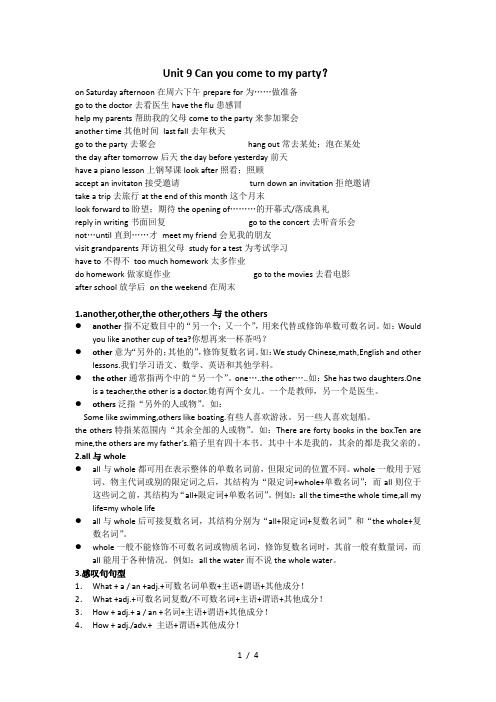
Unit 9 Can you come to my party?on Saturday afternoon在周六下午prepare for为……做准备go to the doctor去看医生have the flu患感冒help my parents帮助我的父母come to the party来参加聚会another time其他时间last fall去年秋天go to the party去聚会hang out常去某处;泡在某处the day after tomorrow后天the day before yesterday前天have a piano lesson上钢琴课look after照看;照顾accept an invitaton接受邀请turn down an invitation拒绝邀请take a trip去旅行at the end of this month这个月末look forward to盼望;期待the opening of………的开幕式/落成典礼reply in writing书面回复go to the concert去听音乐会not…until直到……才meet my friend会见我的朋友visit grandparents拜访祖父母study for a test为考试学习have to不得不too much homework太多作业do homework做家庭作业go to the movies去看电影after school放学后on the weekend在周末1.another,other,the other,others与the others●another指不定数目中的“另一个;又一个”,用来代替或修饰单数可数名词。
如:Wouldyou like another cup of tea?你想再来一杯茶吗?●other意为“另外的;其他的”,修饰复数名词。
unit 9 can you come to my party Section B 2a-2d

We are serving ____ food and ______ drinks from 7:30 p.m. Please _______ invite your friends and family. A party is more ____ fun with more people! Please let us _____ know by Wednesday ___ if you can come to the party. Hope you can make it!
3. I look forward to hearing from you all. 我期盼着你们的答复。 look forward to 是一个固定的结构,表 示“期待;期盼”,其中to是介词,因此 后面若使用动词,要使用其-ing形式。 I look forward to your reply. 我期待你的答复。 I’m really looking forward to seeing my little grandson again. 我好期待再次见到我的小孙子。
Passage 1 accept the invitation Passage 2 turn down an invitation Passage 3 make an invitation
Read the messages again 2c and answer the questions. 1.What kind of party is it? __________________ It is a surprise party. (farewell party) 2. Who is the party for? __________________________ It is for Ms. Steen. 3. When is the party? __________________________ It is on next Friday the 28th. 4. Who did David invite to the party? _______________________________ He invited his classmates to the party. 5. What can people do at the party? People can play games, eat and ___________________________ ____________________ drink at the party.
人教版英语八年级上册Unit 9《Can you come to my party》教学设计

人教版英语八年级上册Unit 9《Can you come to my party》教学设计一. 教材分析人教版英语八年级上册Unit 9主要讲述了关于邀请别人参加聚会的情境。
通过本单元的学习,学生能够掌握与聚会相关的词汇和表达方式,学会如何礼貌地邀请别人,并能够用英语进行简单的交流。
本单元的核心句型是“Can you come to my party?”,以及回答“Yes, I can.”和“No, I can’t.”。
二. 学情分析八年级的学生已经具备了一定的英语基础,能够听懂并运用简单的英语进行交流。
他们对学习英语有浓厚的兴趣,并且愿意积极参与课堂活动。
然而,部分学生可能在口语表达和听力方面还存在一定的困难,需要教师的引导和帮助。
三. 教学目标1.知识目标:学生能够掌握与聚会相关的词汇和表达方式,学会如何礼貌地邀请别人,并能够用英语进行简单的交流。
2.能力目标:学生能够听懂并运用核心句型“Can you come to my party?”进行交流,提高口语表达能力。
3.情感目标:学生能够在课堂上积极参与,培养合作意识和团队精神。
四. 教学重难点1.重点:学生能够听懂并运用核心句型“Can you come to my party?”进行交流。
2.难点:学生能够正确使用情态动词“can”来表达自己的能力。
五. 教学方法1.情境教学法:通过创设真实的聚会情境,激发学生的学习兴趣,提高他们的口语表达能力。
2.交际法:通过小组讨论和角色扮演等方式,培养学生的合作意识和团队精神。
3.任务型教学法:通过完成各种任务,引导学生主动参与学习过程,提高他们的自主学习能力。
六. 教学准备1.教学材料:教材、多媒体课件、录音机、磁带或音频文件。
2.教学环境:教室布置成聚会场景,悬挂气球、彩带等装饰物。
七. 教学过程1.导入(5分钟)教师以提问的方式引导学生回顾已学过的与聚会相关的词汇,如“birthday party”、“house party”等。
2013 unit9 Can you come to my party 全单元课件

Explanation
1. can 的用法
(1)表邀请。
若接受邀请,回答为:
OK./All right./Sure./ Of course./Certainly./ Yes(Sure),I’d love(like) to. 若不接受邀请,回答为: Sorry,Ican’t.(+原因)
eg . Can you come to the party?
to meet my friend on Saturday.
Conversation 2
Anna: Hello, Mary! Can you come
to my party on Saturday?
Mary: I’d love to. Do I need to bring anything? Anna: No, I’ll buy all the food and drinks.
2
•
• • • • • •
条件的需要不得不做某事,含有“客观所迫”的 意味,它有人称和数的变化,可用于多种时态中, 否定式为don’t have to意为“不必”。 must强调说话者主观上认为必须做某事,含有 “主观判断”的意味,它的否定式为mustn’t意为 “禁止,不允许”。 eg. If one gets ill,he’ll have to see a doctor. She has to go to school by bus. We must go to school on time. ---Must I finish the homework now ? ---Yes, you must./No,you needn’t(don’t have to). You mustn’t play football in the classroom.
八年级英语上册 Unit 9 Can you come to my party?单元知识归纳
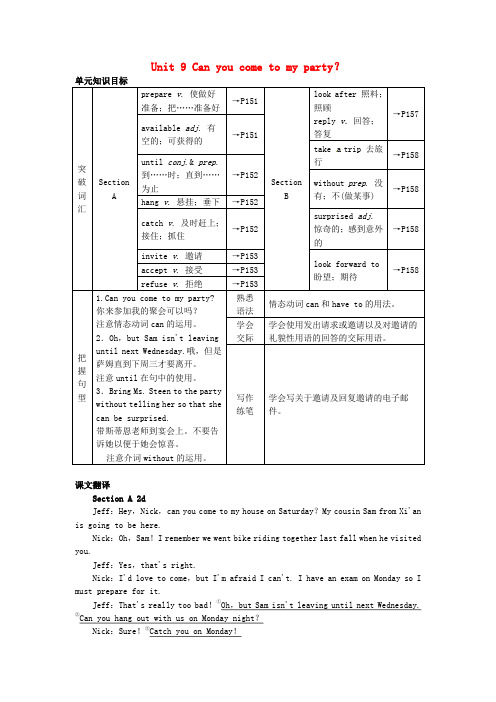
Unit 9 Can you come to my party?a课文翻译Section A 2dJeff:Hey,Nick,can you come to my house on Saturday?My cousin Sam from Xi'an is going to be here.Nick:Oh,Sam!I remember we went bike riding together last fall when he visited you.Jeff:Yes,that's right.Nick:I'd love to come,but I'm afraid I can't. I have an exam on Monday so I must prepare for it.Jeff:That's really too bad!①Oh,but Sam isn't leaving until next Wednesday.②Can you hang out with us on Monday night?Nick:Sure!③Catch you on Monday!杰夫:嘿,尼克,星期六你能来我家吗?我来自西安的表弟萨姆打算到这儿。
尼克:哦,萨姆!我记得去年秋天他来看你时,我们一起骑自行车旅行过。
杰夫:是的,很对。
尼克:我想去,但是恐怕不行。
星期一我有一次考试,所以我必须为此而准备。
杰夫:那真是太糟糕了!哦,但是萨姆直到下周三才要离开。
你可以在周一晚上和我们去闲逛吗?尼克:当然可以了!周一见你们!知识详解1.—Jenny,can you come to my party on Saturday afternoon?詹妮,星期六下午你能来参加我的聚会吗?—Sure,I'd love to.当然,我很愿意。
【解读】本句是一般疑问句。
人教新目标英语八年级上册《Unit 9 Can you come to my party》(sectionA1a-2c)教学设计
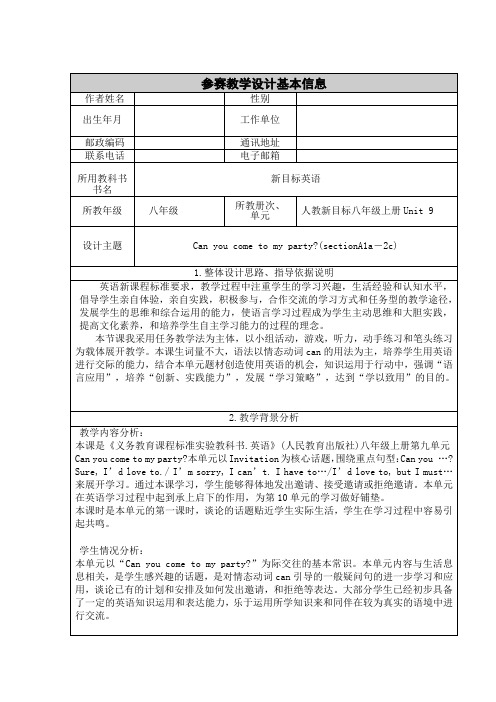
评价方法 教师课上及时口头鼓励,表扬同学们的精彩表现,并配五角星实物图和鼓掌给与小
组合作竞争的评价。课后布置口头练习或布置任务,利用得分制对活动效果或任务的完 成情况进行评价。 练习
Ⅰ.单项选择
( )1.—Can you go to the movies with us tomorrow night?
6.教学评价设计
评价内容: 本课我是以任务教学法为主体,以小组活动,游戏,听力,动手练习和笔头练习为
载体展开教学。并对学生的语言、行为、回答问题、小组竞争给予及时评价。从以下 几个方面来考查学生的学习情况,并将学生的学习评价融入到教学过程中: 1、学生的课堂参与情况,积极主动,声音响亮,能较流畅地表达想要说的话; 2、小组合作学习情况,小组成员共同努力较好的完成学习任务; 3、知识的掌握能力,是否很好的掌握所学,并且能学以致用; 4、少数学困生的学习态度,学生中的两极分化现象比较严重,尤其是中等及中等偏下 的学生对英语学习兴趣不浓,信心不足。
2、以 What do you usually do on weekends? 来提问,这样既可复习旧的句型,也可
以图片呈现方式引处新的短语:study for a test, go to the doctor, have a piano
lesson, help my parents, visit my friends.
2013人教版新目标英语八年级上Unit_9_Can_you_come_to_my_party_Section_A_2d-Grammar Focus

On Monday night. ___________________________________
1. What did they do last fall? 2d They went bike riding. ___________________________________ 2. What does Nick have to do on Saturday? Nick has to prepare for an exam. ___________________________________
1. I have an exam on Monday so I must
prepare for it.
周一有考试,所以我必须为其做准备。
一、prepare用作及物动词时
1). prepare sth.表示“准备......”,后接名词或
代词作宾语
e.g. Our English teacher was preparing the
Jeff: That’s really too bad! Oh, but Sam isn’t
leaving until next Wednesday. Can you
hang out with us on Monday night?
Nick: Sure! Catch you on Monday!
P662d 1在周六来我家come to my house on Saturday 2表哥Sam从西安 my cousin Sam from Xi’an be here/come here 3来这 4一起骑车去玩 go bike riding together 5去年秋天 last fall/last autumn 6拜访你 visit you 7愿意来 love to come 8害怕去做某事 be afraid to do sth have an exam on Monday 9周一考试 10必须为…准备 must prepare for… 11真的太糟糕 really too bad be not leave until next Wednesday 12直到下周一才离开 hang out with us on Monday 13在周一晚上与我们闲逛 14周一见 Catch you on Monday/See you o conversation.
Unit-9-Can-you-come-to-my-party?课件

( D )3. — Can I use your pen, Jim?
—
I’m using it now.
A. Sure, you can.
B. Thank you.
C. Sorry, I’d love to.
D. I’m afraid not.
( B )4. — Can you go camping with us tomorrow?
C. Simply
D. Normally
C. saved
D. improved
C. policewomen D. girls
C. successful D. upset
C. hard-working D. wonderful
C. culture
D. problem
C. example
D. meeting
一
二
三
四
五
返回目录
A: Hey, Rick. 1. B
B: For what? A: It’s my thirteenth birthday. 2. F
B: 3. A One of my pen pals will come to see me on Saturday evening. A: I see. I hope you can have a good weekend. B: Many thanks. 4. G He always saysit is a great city and expects to visit Shanghai. A: That’s right. 5. D g
English exam .
4. It was late when he came downstairs. But luckily, he caught
Unit 9 Can you come to my party_教学设计

Unit 9 Can you come to my party?Goals● To learn to use can for invitations, modal have to, present progressive as future for plannedactions ● To make, accept and decline invitation ● To talk about obligation ProceduresWarming up by learning grammar ●What are Modal Verbs?Modal verbs are special verbs which behave very differently from normal verbs. Here are some important differences:1. Modal verbs do not take "-s" in the third person. EXAMPLES:He can speak Chinese.She should be here by 9:00.2. You use "not" to make modal verbs negative, even in Simple Present and Simple Past. EXAMPLES:He should not be late.They might not come to the party.3. Many modal verbs cannot be used in the past tenses or the future tenses. EXAMPLES:He will can go with us.NOT CORRECTShe musted study very hard. NOT CORRECT(Requests usually refer to the near future.) (Requests usually refer to the near future.)have to necessity 1. She has to read four books forthis literature class.2. She had to finish the first bookbefore the midterm.3. She will have to finish the otherbooks before the final exam.1. She doesn't have to read "Grapes ofWrath." It's optional reading for extracredit.2. She didn't have to write a critique of"The Scarlet Letter." She had to give apresentation to her class.3. She won't have to take any otherliterature classes. American Literature 101is the only required course.mustdon't have tochoice/no obligation 1. I don't have to take any tests. The course is just for fun.2. I didn't have to take the test. The teacher let me do a report instead.3. I won't have to take the test. It's going to be for extra credit and I don't need the points.Warming up by talking about the partyHello, everyone!Today we shall take up unit 9. The title of this unit is that Can you come to my party?Do you like parties? I think most of you will say,” Yeah”. At the party we have lots of fun eating, drinking, singing, dancing and talking. And we can also make new friends. But how do you answer when someone asks you to take part in a party? If you want to go to the party,you can say,” Sure, I’d love to.” If you have to do some other things at the same time, you can say,“I’m sorry. I have to -----.”Please look at the blackboard and re ad after me the targetCan you come to my party?----Sure, I’d love to.Can you come to my party?---I’m sorry. I have to study for a test.an invitation the first time it is offered. In such placespeople usually thank the person but do not give adefinite answer at that time. But in the United Statesit is polite to accept or refuse an invitation the first time it is offered. Also, Americans usually give a reason when they have to say no to an invitation. 1A: Matching the words with the picturesPlease look at the picture. The boy in the middle will hold a party. Caneveryone come to the party? Each thought bubble shows a person doingsomething. Please tell me what you see in each scene. And then look at theblackboard and check you answer.prepare for an exam, help my parents, go to the doctor, meet my friend, have the fluLet’s check the answers.1b Listening and writingYou are great! As you see, there are some people in the picture. Do you know who’s who? Now please listen to the conversation. Especially li sten to Sun Ning’s words carefully. He says the names of each person he is inviting. When I play the recording for the first time, you just listen carefully. When I play the recording for the second time, please write the names of each person next to his o r her picture. You have to complete the activity individually. OK, now let’s check the answers.Read the tapescript to underline the expressions and shaow the c an for invitations, modal have to and present progressive as future, for planned actions.1c Practicing oral English using the languageNow please make your own dialogues in groups of four. Suppose you are the students in the picture. One of you is students A inviting the other three students to your party. The other studentsA: Can you come to my party on Saturday afternoon?B:Sure. I’d love to.C: Sorry, I can’t. I have to prepare for an exam.D: I’m sorry, too. I have to go to the doctor.and pronunciation support if you need.2a Listening and understandingPlease look at these five sentences, and read them. The first time saycan and the second time say can’t. Do you know which one is correct?Let’s listen to the tape. There are five conversations numbered 1 to 5.In each conversation the person says he can or he can’t come to the party. Listen to each conversation carefully and circle the word that makes the sentences correct. For example, the word can’t have a circle around it in sentence1. So sentence1 is Jeff can’t come to the party. I will play the recording twice. First time you just listen carefully and the second time please circle can or can’t.Ok, let’s check the answer2b ListeningYou have heard the conversations twice and have got to know who can come to the party and who can’t come to the party. But why can’t those three persons come? Here are five reasons. Which are correct ones? Please listen to the tape again and write the number of the conversation (1 to 3) in front of the reasons. Two of them are not in the recording. These two have no answer. Listen again and check your answers.●To learn the new words: today, tomorrow, the day after tomorrowProcedures1aWriting the datesWelcome back to the English class. Do you know what day is it today? Yes, it is Wednesday today. And today we will study Section B. Please look at the top of the calendarin your book and read these words aloud. Do you remember them?(Sunday, Monday, Tuesday, Wednesday,Thursday, Friday, Saturday)Good! Look at the blackboard please. Here is a current calendar. Mary, please point out today’s date. Yes, it’s 12th October. What about the other dates of this week? Now please copy theseSunday the 9th Mondaythe 10thTuesdaythe 11thWednesdaythe 12thThursdaythe 13thFridaythe 14thSaturdaythe 15th.1b Writing daysPlease look at the calendar again. As you see, today is Wednesday the 12th. Look at the box on the Today, tomorrow, yesterday, the day after tomorrow, weekdaySunday the 9th Mondaythe 10thTuesdaythe 11thWednesdaythe 12thThursdaythe 13thFridaythe 14thSaturdaythe 15th weekday yesterday today tomorrow the dayaftertomorrowagainst those on the board.1c Doing pairwork and playing gamesNow look at the dialogue in 1c. Tom and Tim please read it to the class aloud. Then make the similar dialogue in pairs. One student points to a date and asks,What’s today?The other one answers, It’s (Monday) the (10th).After finishing practicing, let’s play the game of s peed. Please look at the calendar on the board and listen carefully. When I point to a date on the calendar and say yesterday,today and tomorrow,I’ll say a student’s name. This student has to respondwithin five seconds with the correct date. For example, if I say (yesterday) andpoint to (Wednesday, the 12th) this student has to say, (It’s Tuesday, the 11th).Now let’s play this game and see how fast you can respond with correct answers. Let’s find who the champion is.2a Make a list of the kinds of parties people have.2b Skim the message below. Why did the people write them? Match the reason with each message below.1. accept an invitation2. make an invitation3. turn down an invitation。
人教英语八年级上册导学案:Unit 9Can you come to my party
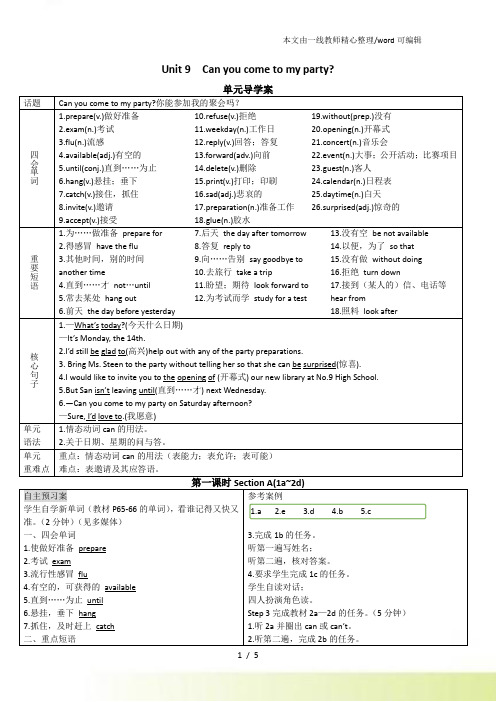
Unit 9 Can you come to my party? 话题Can you come to my party?你能参加我的聚会吗?四会单词1.prepare(v.)做好准备2.exam(n.)考试3.flu(n.)流感4.available(adj.)有空的5.until(conj.)直到……为止6.hang(v.)悬挂;垂下7.catch(v.)接住,抓住8.invite(v.)邀请9.accept(v.)接受10.refuse(v.)拒绝11.weekday(n.)工作日12.reply(v.)回答;答复13.forward(adv.)向前14.delete(v.)删除15.print(v.)打印;印刷16.sad(adj.)悲哀的17.preparation(n.)准备工作18.glue(n.)胶水19.without(prep.)没有20.opening(n.)开幕式21.concert(n.)音乐会22.event(n.)大事;公开活动;比赛项目23.guest(n.)客人24.calendar(n.)日程表25.daytime(n.)白天26.surprised(adj.)惊奇的重要短语1.为……做准备prepare for2.得感冒have the flu3.其他时间,别的时间another time4.直到……才not…until5.常去某处hang out6.前天the day before yesterday7.后天the day after tomorrow8.答复reply to9.向……告别say goodbye to10.去旅行take a trip11.盼望;期待look forward to12.为考试而学study for a test13.没有空be not available14.以便,为了so that15.没有做without doing16.拒绝turn down17.接到(某人的)信、电话等hear from18.照料look after核心句子1.—What’s today?(今天什么日期)—It’s Monday, the 14th.2.I’d still be glad to(高兴)help out with any of the party preparations.3. Bring Ms. Steen to the party without telling her so that she can be surprised(惊喜).4.I would like to invite you to the opening of (开幕式) our new library at No.9 High School.5.But San isn’t leaving until(直到……才) next Wednesday.6.—Can you come to my party on Saturday afternoon?—Sure, I’d love to.(我愿意)单元语法1.情态动词can的用法。
初中英语《Unit 9 Can you come to my party Section B 2a-2e》优质课教案、教学设计
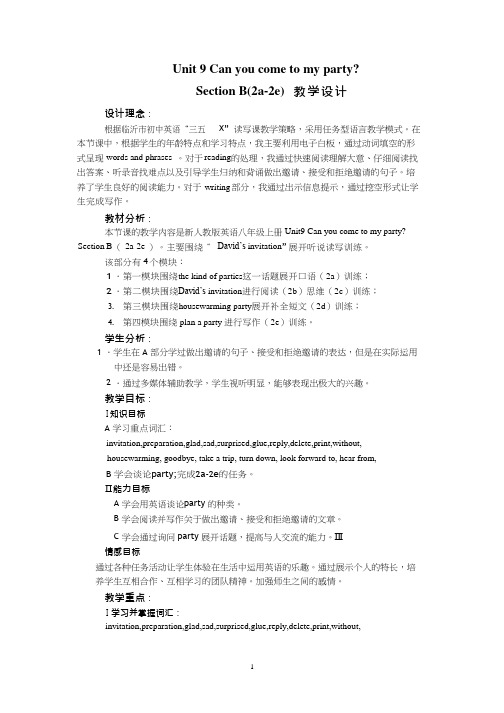
Unit 9 Can you come to my party?Section B(2a-2e) 教学设计设计理念:根据临沂市初中英语“三五X”读写课教学策略,采用任务型语言教学模式。
在本节课中,根据学生的年龄特点和学习特点,我主要利用电子白板,通过动词填空的形式呈现words and phrases 。
对于reading的处理,我通过快速阅读理解大意、仔细阅读找出答案、听录音找难点以及引导学生归纳和背诵做出邀请、接受和拒绝邀请的句子。
培养了学生良好的阅读能力。
对于writing 部分,我通过出示信息提示,通过挖空形式让学生完成写作。
教材分析:本节课的教学内容是新人教版英语八年级上册Unit9 Can you come to my party? Section B (2a-2e )。
主要围绕“David’s invitation”展开听说读写训练。
该部分有4 个模块:1.第一模块围绕the kind of parties这一话题展开口语(2a)训练;2.第二模块围绕David’s invitation进行阅读(2b)思维(2c)训练;3.第三模块围绕housewarming party展开补全短文(2d)训练;4.第四模块围绕plan a party 进行写作(2e)训练。
学生分析:1 .学生在A 部分学过做出邀请的句子、接受和拒绝邀请的表达,但是在实际运用中还是容易出错。
2 .通过多媒体辅助教学,学生视听明显,能够表现出极大的兴趣。
教学目标:Ⅰ知识目标A 学习重点词汇:invitation,preparation,glad,sad,surprised,glue,reply,delete,print,without,housewarming, goodbye, take a trip, turn down, look forward to, hear from,B 学会谈论party;完成2a-2e的任务。
人教版初中英语八年级上册第9单元Section B第二课时教学教案和教学反思

设计,让学生带着问
3. Check answers in class. 4. Ask Ss to read again and fill in the chart.
题阅读,使他们把握 文章的重要信息。
5. Call some Ss to read their answers.
1. Work on 2d.
Check the answers.
1.Work on 2c.
Make Ss read the messages again quickly. Before
阅读之后回答问题并
that, Ss scan the five questions in 2c.
完成表格。通过问题
2. Guide Ss to understand the messages.
Ask Ss read the invitation first and then complete it
with words and phrases from the message on page 37.
Call some Ss to read their answers.
根据所学 2b 的文章,
Practice the phrase: look forward to doing.
精选了 look forward to doing 结构的中考 题,使学生了解这个 结构在中考中的重要 地位。
Step 8 Homework (PPT 30)
1. Read 2b after class. 2. Write your own sentences with the phrases below.
the others add more items on the basis of the list
人教新目标八年级英语上册教案:Unit 9 Can you come to my party

人教新目标八年级英语上册教案:Unit 9 Can you come to my party重点词组1.prepare for 2.have the flu 3.another time4.catch you on Monday 5.hang out 6.the daybeforeyesterday7.the dayaftertomorrow8.look after9.take a trip10.lookforward to11.turn down12.besurprised13.hear fromsb.重点句式1.—Can you come to my party on Saturday? —Sure, I'd loveto./Sorry,I must study for a math test. 2.—Can he go to the party?—No,hecan't.He has to help his parents.单元语法情态动词 can 表示邀请的用法学情分析学生的抽象思维能力较低,形象思维能力强,但注意力容易分散,本单元教学过程中可以对话表演、个人汇报、角色表演等形式展开,并配以适合年龄特点的课件展示,从而增强学生的兴趣和注意力。
第一课时Section A (1a~1c)类别课时要点重点单词1.exam(n.)考试2.prepare(v.)使做好准备3.flu(n.)流感重点词组4.prepare for为……做准备 5.have the flu 得流感6.have to 必须,不得不 7.go to see a/the doctor 去看医生重点句式8.—Can you come to my party on Saturday afternoon? 周六下午你能来参加我的聚会吗?—Sorry, I can't. 对不起,我不能来。
9.I have to prepare for an exam. 我得为考试做准备。
【人教版】2020八年级英语上册 Unit 9 Can you come to my party教案 (新版)人教新目标版
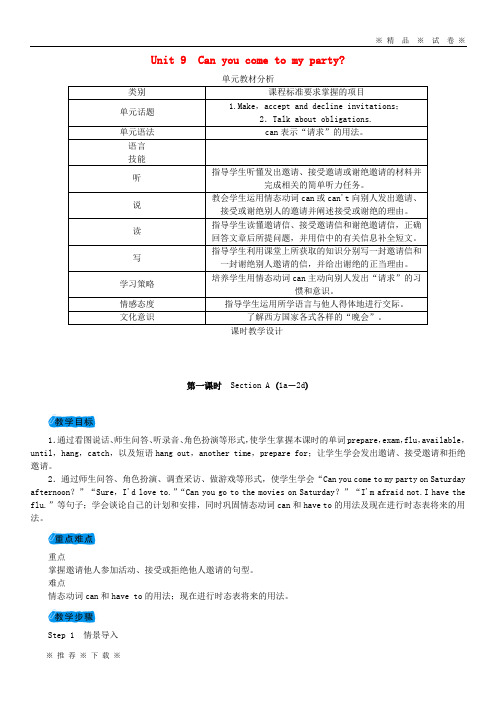
Unit 9 Can you come to my party?课时教学设计第一课时Section A (1a-2d)1.通过看图说话、师生问答、听录音、角色扮演等形式,使学生掌握本课时的单词prepare,exam,flu,available,until,hang,catch,以及短语hang out,another time,prepare for;让学生学会发出邀请、接受邀请和拒绝邀请。
2.通过师生问答、角色扮演、调查采访、做游戏等形式,使学生学会“Can you come to my party on Saturday afternoon?”“Sure,I'd love to.”“Can you go to the movies on Saturday?”“I'm afraid not.I have the flu.”等句子;学会谈论自己的计划和安排,同时巩固情态动词can和have to的用法及现在进行时态表将来的用法。
重点掌握邀请他人参加活动、接受或拒绝他人邀请的句型。
难点情态动词can和have to的用法;现在进行时态表将来的用法。
Step 1 情景导入通过自由交际进行复习热身。
For example:T:I'm very glad to see you again.Boys and girls! My birthday is coming. I am having a paty.Do you like parties?Ss:Yes.T:What can you do at a party?S1:I can dance.S2:I can sing.S3:I can play games.S4:I can meet some new friends.S5:I can talk with my friends.T:I am glad you can do so many things.Can you help me prepare for it?Ss:Of course.T:Thank you.Can you come to my party?You can say,“Sure,I'd love to.”If you can't come,you can say,“I'm sorry,I can't.I have to do…”or “I'm sorry,I can't.I'm doing…”Ss:Yes.(设计意图:通过师生自由交际复习热身并导入新课,谈论如何发出邀请、接受邀请和拒绝邀请,激发学生的学习兴趣。
Unit-9-Can-you-come-to-my-party-说课稿

Unit 9 Can you come to my party?Section A 1a—2d 说课稿一.教材分析1.本单元的特点:本单元是是以Can you come to my party?”为中心话题,围绕“发出邀请,接受邀请,拒绝邀请”展开,学习礼貌用语的表达和人际交往的基本常识。
本单元内容与实际生活息息相关,是学生感兴趣的话题,是对情态动词can引导的一般疑问句的进一步学习,又是对谈论已有的计划或安排的巩固。
2.本课时的特点:我要说的Section A 1a—2d是本单元新授课,是本单元知识的导入课,同时也包括了旧知识的学习。
本课时作为整个单元的开始部分,对学生提出了高要求,体现了“在用中学,在学中用,学了就用”的新课标理念,在教材中占有重要地位和作用。
可以说,本课时是本单元的一个极其重要的课时。
二.学情分析八年级学生经过一年多的英语学习,具备了一定的基础和听说能力,正逐步向读,写过渡。
但是这个班的学生由于基础不太好,所以有部分学生学起来很吃力,大部分学生对英语有一定兴趣,但由于知识的安排由浅入深,有少数学生对这门学科产生了厌恶心理,消除学生厌学情绪,激发学习兴趣显得至关重要。
三.教学目标1. 知识目标1) 能掌握以下单词:prepare, prepare for, exam, flu, available, another time, until, hang, hang out, catch2) 能掌握以下句型:①— Can you come to my party on Saturday afternoon?—Sure, I’d love to. / Sure. Thanks for asking. (接受邀请)②— Can you go to the movies on Saturday?—I’m sorry, I’m not available. I have too much homework this weekend. (拒绝邀请)2.能力目标培养语言表达能力,合作沟通能力,归纳概括能力,分析解决问题能力。
Unit_9_Can_you_come_to_my_party_Section_A_2

5. 当然可以,听起来很棒。 _____, that _______ _____. Sure sounds great 6. 恐怕不行,我得了流感。 afraid flu I’m ______ not. I have the ____. 7. 他能去聚会吗? ____ he ___ to the party? Can go 8. 不能。他得帮助他的父母。 No, he _____. He _____ to help his parents. can’t has 9. 她能参加棒球比赛吗? ____ she go to the baseball ______? Can game
A. That’s too bad.
B. Can you come to my party? C. Are you going shopping with me? D. Maybe another time. E. I have to study for a test. F. When is it? G. I’d love to.
答案:
1. Can you play tennis with us? Sure. I’d love to. 2. Would you like to go to the movies? I’m afraid I can’t. I might have to prepare for the math exam. 3. Can you hang out with us tonight? Sorry. I can’t. I must help my mom at home. 4. Would you like to come to my birthday party? Sure. I’d love to.
Unit 9 Can you come to my party_ Section B 2a-2e说课
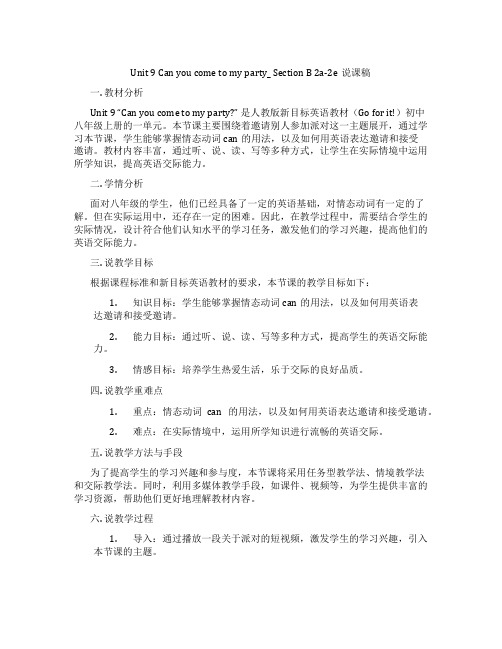
Unit 9 Can you come to my party_ Section B 2a-2e说课稿一. 教材分析Unit 9 “Can you come to my party?” 是人教版新目标英语教材(Go for it!)初中八年级上册的一单元。
本节课主要围绕着邀请别人参加派对这一主题展开,通过学习本节课,学生能够掌握情态动词can的用法,以及如何用英语表达邀请和接受邀请。
教材内容丰富,通过听、说、读、写等多种方式,让学生在实际情境中运用所学知识,提高英语交际能力。
二. 学情分析面对八年级的学生,他们已经具备了一定的英语基础,对情态动词有一定的了解。
但在实际运用中,还存在一定的困难。
因此,在教学过程中,需要结合学生的实际情况,设计符合他们认知水平的学习任务,激发他们的学习兴趣,提高他们的英语交际能力。
三. 说教学目标根据课程标准和新目标英语教材的要求,本节课的教学目标如下:1.知识目标:学生能够掌握情态动词can的用法,以及如何用英语表达邀请和接受邀请。
2.能力目标:通过听、说、读、写等多种方式,提高学生的英语交际能力。
3.情感目标:培养学生热爱生活,乐于交际的良好品质。
四. 说教学重难点1.重点:情态动词can的用法,以及如何用英语表达邀请和接受邀请。
2.难点:在实际情境中,运用所学知识进行流畅的英语交际。
五. 说教学方法与手段为了提高学生的学习兴趣和参与度,本节课将采用任务型教学法、情境教学法和交际教学法。
同时,利用多媒体教学手段,如课件、视频等,为学生提供丰富的学习资源,帮助他们更好地理解教材内容。
六. 说教学过程1.导入:通过播放一段关于派对的短视频,激发学生的学习兴趣,引入本节课的主题。
2.呈现:教师展示本节课的主要内容,让学生初步了解情态动词can的用法和邀请别人的表达方式。
3.practice: 学生分组进行角色扮演,模拟邀请和接受邀请的场景,巩固所学知识。
4.拓展:教师引导学生运用所学知识,创作自己的派对邀请函。
- 1、下载文档前请自行甄别文档内容的完整性,平台不提供额外的编辑、内容补充、找答案等附加服务。
- 2、"仅部分预览"的文档,不可在线预览部分如存在完整性等问题,可反馈申请退款(可完整预览的文档不适用该条件!)。
- 3、如文档侵犯您的权益,请联系客服反馈,我们会尽快为您处理(人工客服工作时间:9:00-18:30)。
Unit 9 Can you come to my party?
第二课时Section A(2d3c)
一、根据句意用所给词的适当形式填空。
1.They went bike (ride) with their parents last week. 2.Thank you for (invite) me.
3.—What are you (plan) to do tomorrow?
—I am going to hang out with my friends.
4.She (not leave) until her mother came back. 5.My mother (have) to do the housework in the evening.
二、根据句意用方框中词组的适当形式填空。
play tennis,go to the movies,hang out,study for a test,watch TV
6.Li Na is the best at in the world.
7.My father often after supper.
8.Yesterday he in the classroom and he felt very tired. 9.“Private Tailor”will be on in our city.Let's ______________ tonight.
10.I like because there are a lot of interesting shows.
一、根据句意及汉语提示写单词。
(5×4分=20分)
1.Frank gave Lisa a lot of beautiful flowers,but Lisa (拒绝).2.Yesterday I out(闲逛) with my friends.
3.We didn't read (直到……才) our teacher came in.
4.He (接受) my thanks by having a meal with me.
5.My brother (抓) some birds on my uncle's farm last week.
二、单项选择。
(5×4分=20分)
6.They didn't go to bed ____ they finished the work.
A.when B.while C.until D.after
7.—____ you play baseball?
—No.But I can play table tennis.
A.Can B.May C.Must D.Should
8.—Can you come to have dinner with me this evening?
—I'm afraid not. I ____look after my grandmother.She is ill.
A.can't B.have to C.may D.could
9.—When are we going to meet?
—____you on Monday evening!
A.Catch B.Look
C.Sound D.Invite
10.—Hi,Linda!Can you come to my house this afternoon?We can watch videos at home.
—____ I have to do my homework.
A.Sorry,I have no time. B.When can I go to your house?
C.What kind of videos? D.Sure,I'd love to.
三、根据句意及首字母提示完成短文。
(10×3分=30分)
Lisa's birthday is 11. .She will have a 12. on Friday night.She 13. some of her friends to come to it.But Tom says he 14. come because he 15.
to do his homework at home.Simon can't come,either.He will 16. for his math test.Lucy has to 17. the piano.Lucy wants to 18. her grandmother.Her grandmother was 19. yesterday.
Lisa feels very 20. for that.
四、根据汉语意思完成下列句子。
(5×6分=30分)
21.我没有空。
我不能和你去闲逛。
I'm not available.I can't with you.
22.他不得不为英语测验而学习。
He study for the .
23.去年秋天我们一起去骑车了。
We together last fall.
24.星期一我有一场考试,我必须为它做准备。
I have on Monday and I have to it. 25.他直到下个星期五才会离开广州。
He leaving Guangzhou next Friday.
答案riding inviting planning didn't leave has
答案playing tennis hangs out studied for a test go to the movies watching/to watch TV
答案refused hung until accepted caught
答案CABAA
答案party coming invites has can't study practice visit ill sad/sorry
答案hang out has to English test went bike riding an exam prepare for isn't until。
